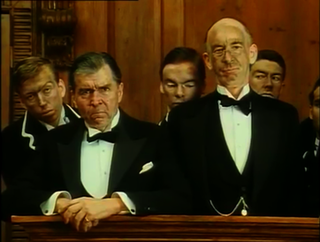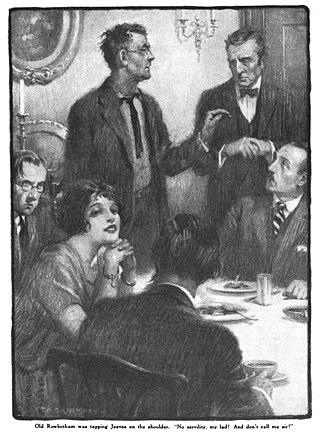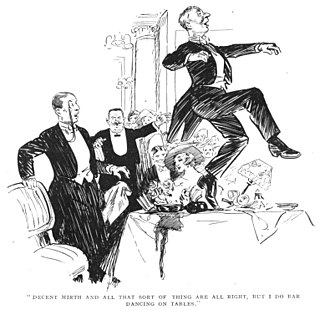
Jeeves is a fictional character in a series of comedic short stories and novels by English author P. G. Wodehouse. Jeeves is the highly competent valet of a wealthy and idle young Londoner named Bertie Wooster. First appearing in print in 1915, Jeeves continued to feature in Wodehouse's work until his last completed novel Aunts Aren't Gentlemen in 1974, a span of 60 years.

Agatha Gregson, née Wooster, later Lady Worplesdon, is a recurring fictional character in the Jeeves stories of the British comic writer P. G. Wodehouse, being best known as Bertie Wooster's Aunt Agatha. Haughty and overbearing, Aunt Agatha wants Bertie to marry a wife she finds suitable, though she never manages to get Bertie married, thanks to Jeeves's interference.

Bertram Wilberforce Wooster is a fictional character in the comedic Jeeves stories created by British author P. G. Wodehouse. An amiable English gentleman and one of the "idle rich", Bertie appears alongside his valet, Jeeves, whose intelligence manages to save Bertie or one of his friends from numerous awkward situations. Bertie Wooster and Jeeves have been described as "one of the great comic double-acts of all time".

Honoria Glossop is a recurring fictional character in the Jeeves stories by English comic writer P. G. Wodehouse. Athletic as well as scholarly, she is a formidable young lady and one of the women whom Bertie Wooster reluctantly becomes engaged to.

The Inimitable Jeeves by P. G. Wodehouse was the first of the Jeeves novels, although not originally conceived as a single narrative, being assembled from a number of short stories featuring the same characters. The book was first published in the United Kingdom by Herbert Jenkins, London, on 17 May 1923 and in the United States by George H. Doran, New York, on 28 September 1923, under the title Jeeves.

Sir Roderick Glossop is a recurring fictional character in the comic novels and short stories of P. G. Wodehouse. Sometimes referred to as a "nerve specialist" or a "loony doctor", he is a prominent practitioner of psychiatry in Wodehouse's works, appearing in several Jeeves stories and in one Blandings Castle story.

"Comrade Bingo" is a short story by P. G. Wodehouse, and features the young gentleman Bertie Wooster and his valet Jeeves. The story was published in The Strand Magazine in London in May 1922, and in Cosmopolitan in New York that same month. The story was also included in the 1923 collection The Inimitable Jeeves as two separate chapters, "Comrade Bingo" and "Bingo Has a Bad Goodwood".

"Extricating Young Gussie" is a short story by the British comic writer P. G. Wodehouse. It was first published in the United States in the 18 September 1915 issue of The Saturday Evening Post and in the United Kingdom in the January 1916 edition of The Strand Magazine. It was included in the collection The Man with Two Left Feet (1917).
"Introduction on Broadway" is the third episode of the third series of the 1990s British comedy television series Jeeves and Wooster. It is also called "Cyril And The Broadway Musical". It first aired in the UK on 12 April 1992 on ITV.

"Aunt Agatha Takes the Count" is a short story by P. G. Wodehouse, and features the young gentleman Bertie Wooster and his valet Jeeves. The story was published in The Strand Magazine in London in April 1922, and then in Cosmopolitan in New York in October 1922. The story was also included in the 1923 collection The Inimitable Jeeves as two separate chapters, "Aunt Agatha Speaks Her Mind" and "Pearls Mean Tears".

"Scoring off Jeeves" is a short story by P. G. Wodehouse, that features a young gentleman Bertie Wooster and his valet Jeeves. The story was published in The Strand Magazine in London in February 1922, and then in Cosmopolitan in New York in March 1922. The story was also included in the 1923 collection The Inimitable Jeeves as two separate chapters, "The Pride of the Woosters Is Wounded" and "The Hero's Reward".

"Sir Roderick Comes to Lunch" is a short story by P. G. Wodehouse, and features the young gentleman Bertie Wooster and his valet Jeeves. The story was published in The Strand Magazine in London in March 1922, and then in Cosmopolitan in New York in April 1922. The story was also included in the 1923 collection The Inimitable Jeeves as two separate chapters, "Introducing Claude and Eustace" and "Sir Roderick Comes to Lunch".

"The Delayed Exit of Claude and Eustace" is a short story by P. G. Wodehouse, and features the young gentleman Bertie Wooster and his valet Jeeves. The story was published in The Strand Magazine in London in October 1922, and then in Cosmopolitan in New York in November 1922. The story was also included in the 1923 collection The Inimitable Jeeves.

"Jeeves and the Unbidden Guest" is a short story by P. G. Wodehouse, and features the young gentleman Bertie Wooster and his valet Jeeves. The story was published in the Saturday Evening Post in the United States in December 1916, and in The Strand Magazine in the United Kingdom in March 1917. The story was also included in the 1925 collection Carry On, Jeeves.
"Without the Option" is a short story by P. G. Wodehouse, and features the young gentleman Bertie Wooster and his valet Jeeves. The story was published in the Saturday Evening Post in the United States in June 1925, and in The Strand Magazine in the United Kingdom in July 1925. The story was also included in the 1925 collection Carry On, Jeeves.
"Jeeves and the Impending Doom" is a short story by P. G. Wodehouse, and features the young gentleman Bertie Wooster and his valet Jeeves. The story was published in The Strand Magazine in the United Kingdom in December 1926, and in Liberty in the United States in January 1927. The story was also included as the first story in the 1930 collection Very Good, Jeeves.
"Episode of the Dog McIntosh" is a short story by P. G. Wodehouse, and features the young gentleman Bertie Wooster and his valet Jeeves. The story was published in The Strand Magazine as "Jeeves and the Dog McIntosh" in the United Kingdom in October 1929, and in Cosmopolitan as "The Borrowed Dog" in the United States that same month. The story was also included as the fifth story in the 1930 collection Very Good, Jeeves.
"The Love that Purifies" is a short story by P. G. Wodehouse, and features the young gentleman Bertie Wooster and his valet Jeeves. The story was published in The Strand Magazine in the United Kingdom in November 1929, and in Cosmopolitan in the United States that same month, as "Jeeves and the Love that Purifies". The story was also included as the eighth story in the 1930 collection Very Good, Jeeves.
"Indian Summer of an Uncle" is a short story by P. G. Wodehouse, and features the young gentleman Bertie Wooster and his valet Jeeves. The story was published in The Strand Magazine in the United Kingdom in March 1930, and in Cosmopolitan in the United States that same month. The story was also included as the tenth story in the 1930 collection Very Good, Jeeves.














